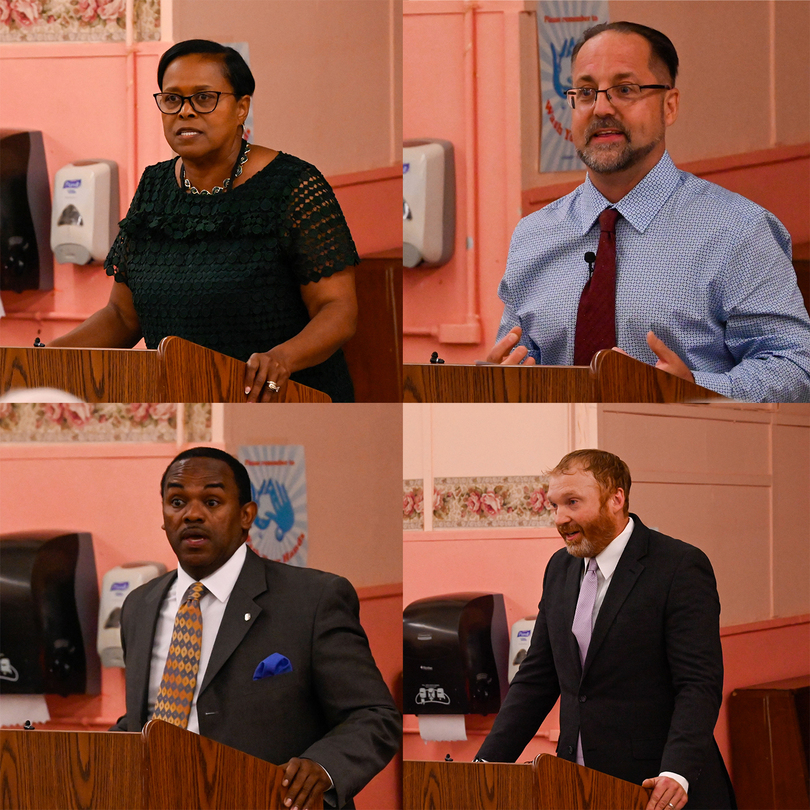Syracuse mayoral candidates dissect affordable housing, policing at 1st debate

Sharon Owens, Tom Babilon, Alfonso Davis and Tim Rudd (left to right) gathered on Tuesday to discuss their backgrounds and their agendas’ goals. The candidates for the Syracuse mayoral race talked about first responders, affordable housing and other issues. Christian Calabrese | Asst. Photo Editor
Get the latest Syracuse news delivered right to your inbox.
Subscribe to our newsletter here.
The four candidates contending for the vote in the city of Syracuse’s mayoral debate deliberated key community issues, including policing and government spending, at their first debate of the election season.
Democratic candidate and current Deputy Mayor Sharon Owens, Republican candidate Tom Babilon and independents Alfonso Davis and Tim Rudd spoke to around 60 attendees at St. John Baptist Parish Hall in the Northside.
The Washington Square Task Force, a Syracuse community group focusing on neighborhood safety, local events and community support, hosted the debate.
Task Force facilitator Bonnke Sekarore mediated the event, aiming to create open dialogue between candidates. Sekarore referred to Tuesday night’s event as a “forum” intended to educate the public on each candidate’s goals as mayor.
“I did not want this to be barking at each other, calling each other names, or anything of that nature,” Sekarore said. “You’re here today because you want to make an informed decision on Nov. 4.”
Introduction
At the forum’s start, each candidate introduced themselves and had five minutes to speak about their backgrounds.
Davis said he’s running on a platform of integrity, accountability and collaboration. From Syracuse’s Southside neighborhood, he spoke of his “non-traditional” route after graduating from Buffalo State University, becoming a nurse’s aide and eventually going back to school for a degree in elementary education.
Davis ran for mayor in 2009, 2013 and 2017 but was removed from the ballot for invalid signatures.
Rudd, the other independent candidate, said his campaign is also focused on accountability, as well as transparency arguing that his roots in Syracuse give him a personal perspective and the professional experience necessary for mayor.
After graduating from Syracuse University in 2004, he eventually ran and won as Finance Chair on the Syracuse City Common Council.
“I was a team player. I think I really paid attention to the interests of the city,” Rudd said.
Rudd served as budget director for the city council, which Rudd said he “did with honor,” but was fired in February over comments made about fellow candidate Owens.
Owens, also an SU alumna, is running as a Democrat with the Working Families Party. After receiving an economics degree from SU, she interned with the Dunbar Center and said she knew she had to continue her work with the people of Syracuse.
Currently serving as deputy mayor under incumbent Mayor Ben Walsh, Owens told attendees she’s running on a platform of executive experience, efficient management and public services.
“There are things we still need to do in the city. We are on a trajectory for amazing promise. I’m the candidate prepared,” Owens said. “It is not speculation. I’m on the ground doing the work, and I’m ready to continue that work.
Babilon, a former city hall lawyer, said he believes his legal experience makes him the right choice for mayor.
Moving to Syracuse in 2003, he spoke on his previous experiences working as assistant corporation counsel for the city under former mayor Matthew Driscoll, and later as the City’s labor and employment attorney.
Focal point
In the 10 minutes each candidate had to speak about their platforms, the four discussed the importance of public safety and using taxpayer funds efficiently. As Syracuse Police Chief Joe Cecile announced his plans to retire at the end of Walsh’s term, the candidates also touched on their ideas for a revamped police force.
Babilon claimed the city lost 40% of its police force between 2003, when he moved to Syracuse, and 2017, when Walsh was elected as mayor.
Since Walsh took office, Babilon said the city has lost over 100 officers.
According to the Syracuse Police Department’s annual report, there were 417 sworn officers and 68 civilian personnel employees in 2017, when Walsh was elected as mayor. In April 2025, the department had around 388 officers, according to WRVO Public Media.
Babilon vowed to allocate more money toward the SPD and its presence in the community.
“How many y’all call the police and they don’t even show up? I know you have. I know you have because it happens to everybody,” Babilon said. “We deserve better from our police officers.”
In response to Babilon’s claim, Owens said the mayor’s office works with the police department, responding to calls that are triaged through the 911 center.
To assist with mental health emergencies, Owens created the “diversionary response” protocol in 2022, allowing 911 dispatchers to send mental health professionals with or instead of police. She hopes to continue strengthening the response unit to assist in non-emergency calls.
“When a person is struggling because of substance use and mental illness, they don’t need an armed police officer. They need a social worker or a mental health professional,” Owens said.
Rudd said he would work directly on the ground with the police and fire departments “one day a week” and assist them in any way they need.
“I want somebody who is going to agree to transparency and accountability. In general, I believe we can find common space,” Rudd said.
Davis spoke on what he sees as a lack of diversity and inclusion within the police department. As mayor, Davis said he would play an active role in recruitment for SPD, creating more jobs for marginalized communities in the city.
He said a key issue the city faces is relationships between residents and police officers. He added that increasing interactions would “change the dynamics.”
Davis said a previous “very racist” police chief affected the narrative of who is included in safety measures. Davis didn’t specify the police chief’s identity.
He related this as a reflection on a national problem, calling President Donald Trump “crazy” and directed a slur at him for attacking the Chicago mayor for “hiring too many black people.”
Closing business
After the forum ended, attendees spoke with the candidates to get a better sense of their platform. Sekarore said the conversations were exactly what he intended the forum to be, calling it “an overall success.”
“I just wanted people to come here and understand the backgrounds of the candidates. There are platforms, and what they plan to do for the people of Syracuse and this great city that we live in,” Sekarore said.
Sekarore said a “general meeting” with all four candidates will be held Oct.7 and said a second forum or debate is being planned.
CORRECTION: A previous version of this article said Babilon claimed 40% of the city’s police have been lost since 2017. This was incorrect. Babilon said this figure was between 2003 and 2017. It also misattributed his reasoning for the loss. This has been removed. The Daily Orange regrets these errors.






